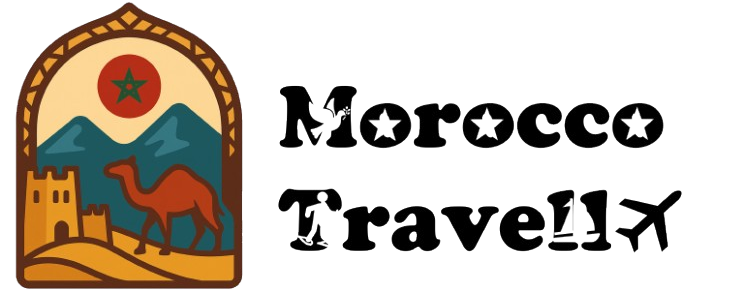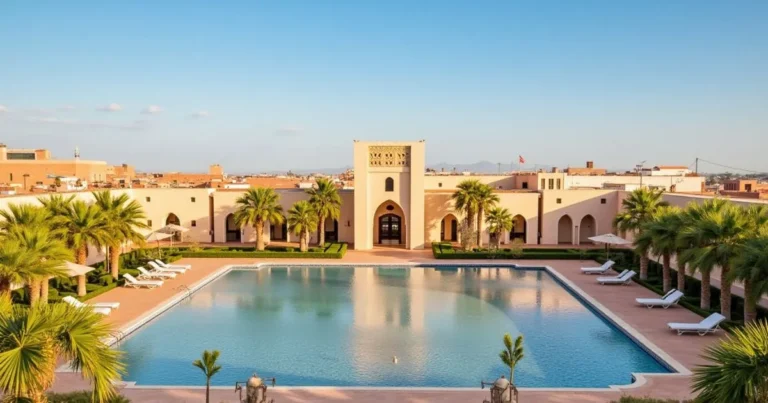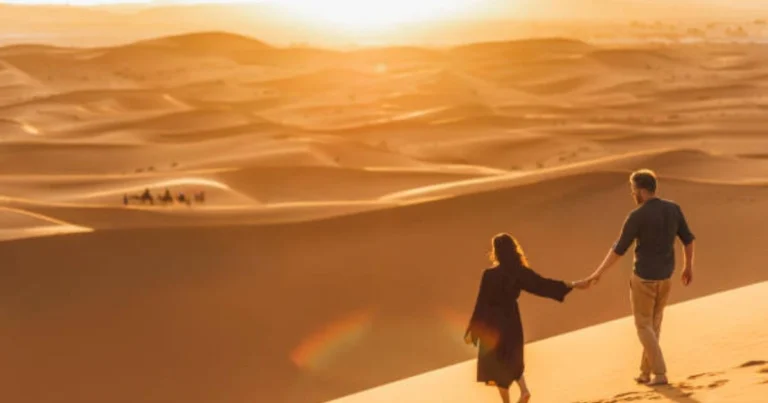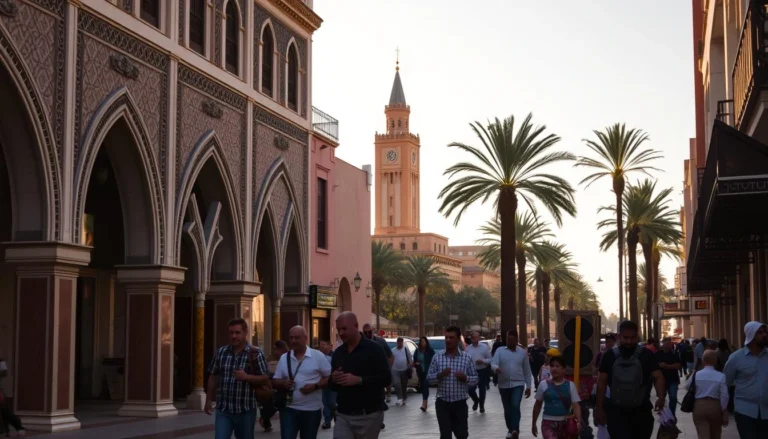Is Morocco Safe for Americans? You’ll Be Surprised
Is Morocco Safe for Americans?
As you plan your trip to Morocco, concerns about safety might be on your mind. You’re not alone; many American travelers wonder if Morocco is a secure destination. The truth is, like many countries, Morocco has its safe and not-so-safe areas.
While it’s natural to have some apprehensions, Morocco has been welcoming tourists for decades, and with some basic precautions, you can have a safe and enjoyable journey. In this article, we’ll explore the safety landscape for American travelers in Morocco, providing you with insights to make informed decisions about your trip.
Table of Contents
The Reality of Safety in Morocco for American Travelers
As you plan your trip to Morocco, understanding the safety landscape is crucial for an enjoyable journey. Morocco, known for its rich cultural heritage and diverse landscapes, is generally considered safe for tourists, including Americans. However, like any travel destination, it’s essential to be aware of the current safety situation.
Current Travel Advisories and Statistics
The U.S. Department of State issues travel advisories for countries around the world, including Morocco. As of the latest update, Morocco is under a Level 2 advisory, indicating that travelers should “exercise increased caution.” Key concerns include terrorism and crime. Statistics show that the overall crime rate against tourists is relatively low, but petty crimes like pickpocketing and scams can occur, particularly in crowded areas and tourist hotspots.
- Petty theft and scams are common in tourist areas.
- Be cautious of your surroundings, especially in crowded places.
- Keep valuables secure and be mindful of your belongings.
Common Misconceptions About Moroccan Safety
Many Americans harbor misconceptions about traveling in Morocco, often fueled by media portrayals. One common myth is that Morocco is unsafe due to high crime rates or terrorism. While it’s true that there are safety concerns, the reality is that most areas frequented by tourists are generally safe. Another misconception is that Morocco is not welcoming to Americans; however, Moroccans are known for their hospitality, and many are eager to engage with visitors from around the world.
By understanding the current safety advisories and dispelling common misconceptions, you can better prepare for a safe and enjoyable trip to Morocco.
Is Morocco Safe for Americans? The Complete Picture
When evaluating the safety of Morocco for American travelers, several key factors come into play. Understanding these elements can help you make informed decisions about your trip and ensure a safe and enjoyable experience.
Crime Rates Affecting Tourists
Morocco is generally considered to have low crime rates compared to other tourist destinations. However, as with any popular travel spot, petty crimes such as pickpocketing and scams can occur, particularly in crowded areas like Marrakech’s medina or major cities. Being aware of your surroundings and keeping valuables secure can significantly reduce your risk of becoming a victim.
Political Stability and Terrorism Risk
Morocco is known for its political stability, which contributes to a safe environment for tourists. The country has a strong track record of counter-terrorism efforts, having experienced a significant terrorist attack in 2018 but subsequently enhancing its security measures. While the risk of terrorism exists, as it does in many countries, Morocco’s proactive approach helps to mitigate this risk.
How Americans Are Generally Perceived by Locals
Americans are generally viewed positively in Morocco, with many Moroccans having a favorable disposition towards the United States. This positive perception can make your travel experience more enjoyable, as locals may be more willing to engage with you and offer assistance when needed. Nonetheless, it’s always a good idea to be respectful of local customs and traditions to foster a positive interaction.
In conclusion, while no destination is completely risk-free, Morocco’s overall safety profile, coupled with its rich cultural heritage and friendly populace, makes it an attractive destination for American travelers. By staying informed and taking basic precautions, you can have a safe and memorable trip.
Regional Safety Guide: Where to Go and Where to Be Cautious
As an American traveler in Morocco, knowing where to go and where to exercise caution can significantly enhance your safety. Morocco’s diverse regions, from bustling cities like Marrakech to the serene coastal towns and adventurous Atlas Mountains, present unique safety considerations.
Navigating Marrakech, Casablanca, and Rabat
Major cities like Marrakech, Casablanca, and Rabat are generally considered safe for tourists, with low crime rates compared to other major cities worldwide. However, petty theft and scams are common, so it’s essential to remain vigilant, especially in crowded areas and tourist hotspots.
In Marrakech, for instance, the Medina (old city) is a bustling area that requires caution due to dense crowds and aggressive vendors. Casablanca, on the other hand, is more modern and laid-back but still demands awareness of your surroundings, particularly at night.
Coastal Areas: Essaouira, Agadir, and Tangier
The coastal towns of Essaouira, Agadir, and Tangier offer a more relaxed atmosphere and are considered safe for tourists. Essaouira, known for its artistic vibe and windsurfing, is particularly welcoming. Agadir is a popular beach destination with a strong focus on tourist safety.
Tangier, while generally safe, has areas that require caution, especially at night. Being aware of your surroundings and keeping valuables secure is advisable.
Exploring the Atlas Mountains and Desert Regions
Venture into the Atlas Mountains or the desert regions, and you’ll encounter a different kind of safety consideration. While these areas are generally safe for tourists, the rugged terrain and remote locations can pose risks. Guided tours can significantly enhance safety in these regions.
Border Regions and Areas to Avoid
Certain areas near Morocco’s borders, particularly those adjacent to Western Sahara and Algeria, are considered sensitive and should be avoided due to security concerns. Staying informed about current conditions and following local advice is crucial.
How to Prepare for a Safe Trip to Morocco
Embarking on a journey to Morocco requires some groundwork to make your trip both memorable and safe. As you prepare, focusing on the right aspects can significantly enhance your travel experience.
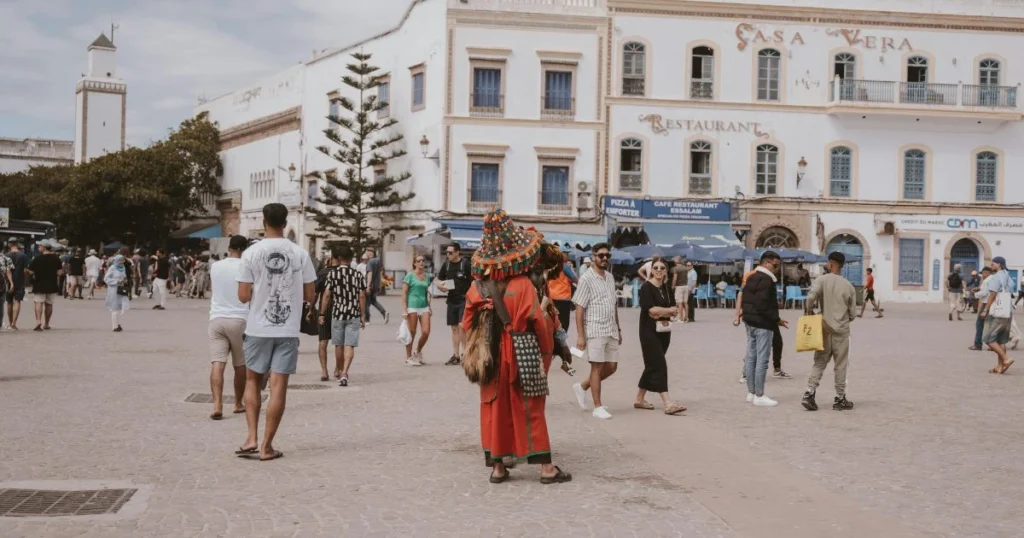
Essential Documents and Copies
First and foremost, ensure your passport is valid for at least six months beyond your planned departure date from Morocco. Make digital copies of your passport, visa (if required), and travel insurance documents. Leave a copy with a trusted friend or family member back home and carry another set with you, separate from the originals.
Pre-Trip Research and Planning
Understanding the local culture, customs, and current events can greatly contribute to a smooth trip. Research your destinations within Morocco, including local customs, dress codes, and any travel advisories. Planning your itinerary and booking accommodations in advance can also help minimize risks.
Packing for Safety and Comfort
Packing wisely is crucial for both safety and comfort. Include essentials like comfortable clothing suitable for the local climate, a first-aid kit, and any personal medications. Consider packing a money belt and keeping your valuables secure. Morocco’s climate varies significantly between regions, so check the weather forecast for your destinations and pack accordingly.
By taking these steps, you’ll be well-prepared for a safe and enjoyable trip to Morocco. Remember, a little preparation goes a long way in making your travel experience memorable.
Cultural Considerations That Impact Your Safety
As an American traveling to Morocco, being aware of the local customs and cultural practices can significantly enhance your safety and travel experience. Morocco is a country with a rich cultural heritage, influenced by Arab, Berber, and French traditions, creating a unique societal fabric.
Dress Codes and Respectful Behavior
Morocco is a conservative country, and dressing modestly is essential, especially when visiting mosques or rural areas. Covering your shoulders and knees is a sign of respect, and both men and women are advised to avoid revealing clothing. When interacting with locals, be mindful of your body language; for instance, using your left hand for eating or giving/receiving something is considered impolite.
- Dress modestly, covering shoulders and knees.
- Avoid public displays of affection.
- Remove your shoes before entering mosques or homes.
Religious Customs During Ramadan and Year-Round
Ramadan is a significant period in Morocco, and respecting the fasting month is crucial. Avoid eating, drinking, or smoking in public during daylight hours out of respect for those fasting. Understanding and respecting Islamic customs and traditions will help you navigate daily life and interactions during Ramadan and beyond.
Gender-Specific Safety Concerns
While Morocco is generally welcoming to tourists, women may face specific challenges, including unwanted attention. Dressing conservatively and being aware of your surroundings can help minimize these issues. Men, too, should be mindful of their behavior, as public displays of affection, even between couples, are frowned upon.
By being informed and respectful of Morocco’s cultural norms, you can significantly enhance your safety and the quality of your travel experience.
10 Essential Safety Tips for Americans in Morocco
As you plan your trip to Morocco, it’s crucial to familiarize yourself with essential safety tips to make the most of your time in this beautiful North African country. Morocco is generally a safe destination for tourists, but being aware of certain precautions can help you navigate any challenges that may arise during your journey.
Avoiding Common Scams and Tourist Traps
One of the key aspects of staying safe in Morocco is to be cautious of scams and tourist traps. Be wary of overly friendly locals who approach you with unsolicited offers or guidance. Here are some tips to avoid common scams:
- Be cautious of people who approach you with “deals” that seem too good to be true.
- Avoid engaging with aggressive vendors or guides who may be trying to scam you.
- Research reputable tour operators and use licensed guides to avoid being taken advantage of.
Managing Money and Valuables
Managing your money and valuables securely is vital when traveling in Morocco. Here are some tips to help you do so:
- Use reputable currency exchange services or banks to exchange your money.
- Keep your valuables secure and consider using a hotel safe or a money belt.
- Be mindful of your surroundings when using ATMs or carrying large amounts of cash.
Transportation Safety Practices
When it comes to transportation in Morocco, there are several safety practices to keep in mind. Here are a few:
- Use licensed taxis or reputable transportation services to avoid being scammed.
- Always wear a seatbelt when traveling by car.
- Be aware of your surroundings when using public transportation, and keep an eye on your belongings.
Digital Security and Communication
In today’s digital age, it’s essential to prioritize digital security and communication when traveling abroad. Here are some tips:
- Use a VPN to secure your internet connection when using public Wi-Fi.
- Keep your phone and laptop secure with strong passwords and up-to-date software.
- Consider purchasing a local SIM card or portable Wi-Fi hotspot to stay connected.
By following these 10 essential safety tips, you’ll be well-equipped to handle the challenges of traveling in Morocco and enjoy a safe and memorable trip.
Special Safety Considerations for Different Travelers
Traveling to Morocco can be an exhilarating experience, but different travelers face different safety challenges; understanding these can help you prepare and stay safe. Morocco is generally welcoming to tourists, but being aware of the local culture, customs, and potential hazards can make a significant difference in your travel experience.
Solo Travelers: Staying Safe on Your Own
As a solo traveler in Morocco, you may attract more attention, but with some basic precautions, you can minimize risks. Staying in well-lit, populated areas, especially at night, and keeping your valuables secure are good practices. Consider joining group tours or activities to meet other travelers and gain local insights.
It’s also a good idea to let someone know your itinerary and check in with them regularly. Solo travelers should be cautious when interacting with strangers, avoiding unsolicited advice or offers that seem too good to be true.
Family Travel: Keeping Children Safe
When traveling with family, Morocco can be a fantastic destination, rich in history and culture that can captivate children of all ages. However, keeping a close eye on your children, especially in crowded areas or tourist hotspots, is crucial. Teach your children basic safety rules, such as staying close to you and not talking to strangers.
Consider the age and health of your children when planning activities, as some attractions may not be suitable for very young children. Morocco’s medina areas can be particularly challenging to navigate with strollers, so plan accordingly.
LGBTQ+ Travelers: Understanding Local Attitudes
Morocco is a conservative country, and public displays of affection, regardless of orientation, are generally frowned upon. While there are no specific laws against LGBTQ+ individuals, the local culture may not be very accepting. Discretion is advised to avoid unwanted attention.
Staying informed about local attitudes and laws can help LGBTQ+ travelers have a more enjoyable and safe experience. Connecting with local LGBTQ+ communities or groups can provide valuable insights and support.
Women Travelers: Specific Precautions
Women traveling alone in Morocco may encounter unwanted attention, but this can often be managed with appropriate dress and behavior. Dressing modestly, covering your shoulders and knees, can help you blend in and show respect for local customs.
Avoiding traveling alone at night and being cautious with strangers are prudent measures. You can also consider joining women-only tours or groups for added safety and camaraderie.
Health and Medical Safety in Morocco
As you plan your trip to Morocco, it’s essential to consider the health and medical safety aspects to ensure a worry-free vacation. Morocco, like many countries, has its unique health concerns, but with proper preparation, you can minimize risks and enjoy your travel.
Vaccinations and Medications
Before traveling to Morocco, consult your healthcare provider about recommended vaccinations and medications. Routine vaccinations such as MMR, DTaP, and polio are usually advised, and depending on your travel plans, you might also need vaccinations for Hepatitis A and Typhoid.
It’s also crucial to ensure you’re up-to-date on any prescription medications and bring sufficient supplies for the duration of your trip, along with a copy of your prescription and a letter explaining your medical condition if applicable.
Food and Water Safety
To avoid foodborne illnesses, it’s advisable to eat at reputable restaurants and street food stalls that are busy and have a high turnover of food. Drink bottled or filtered water, and avoid consuming ice or unpeeled fruits and vegetables that may have been washed in tap water.
Moroccan cuisine is rich and varied, but be cautious with undercooked meat or seafood. Ensuring that your food is cooked thoroughly can significantly reduce the risk of getting sick.
Accessing Medical Care
In case of a medical emergency, Morocco has a decent healthcare system, particularly in major cities like Marrakech and Casablanca. Private hospitals often provide high-quality care, and some medical staff speak English.
It’s vital to have travel insurance that covers medical evacuations if necessary. Keep a list of emergency contact numbers, including your insurance provider and local emergency services.
Travel Insurance Requirements
Travel insurance that includes medical coverage is highly recommended for Morocco. Ensure your policy covers medical evacuations and has sufficient coverage for any potential medical expenses.
Before purchasing, review the policy’s terms and conditions to understand what is covered and what is not, including any pre-existing condition clauses.
Conclusion: Enjoying Morocco Safely as an American Traveler
As you’ve explored throughout this article, Morocco can be a safe and rewarding destination for American travelers. By understanding the local culture, being aware of your surroundings, and taking necessary precautions, you can enjoy Morocco safely and make the most of your trip.
To recap, Morocco travel tips include being mindful of regional safety variations, respecting local customs, and staying informed about current events. You should also take practical steps such as registering with the U.S. Department of State’s Smart Traveler Enrollment Program (STEP) and staying connected with family and friends back home.
While it’s natural to have concerns about is Morocco safe for Americans, the reality is that with proper preparation and knowledge, you can have a secure and enjoyable experience. By following the safety tips and guidelines outlined in this article, you’ll be well-equipped to navigate Morocco with confidence, enjoying the rich history, vibrant culture, and breathtaking landscapes that this fascinating country has to offer.
